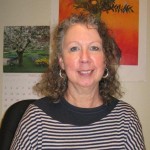April is Student Employment Month, when we recognize and celebrate student staff members for their important contributions to the Puget Sound community.
It’s also a time to both thank supervisors for their support of the student employment program, and highlight the importance of their role in students’ career/professional development.
We asked several campus supervisors and partners to reflect on ways in which their department helps student staff members achieve their best work for the university, and how they support students’ career development.
Creating meaning through context
Student work is vitally important to institutional success. How can supervisors communicate to students that their work is meaningful?

Sarah Comstock, assistant director of student activities
for the Wheelock Student Center, hires and supervises students who run the Information Center. “From the beginning of their interview with me, student staff are given information on why their job is so important. ‘You are the front line to this campus’ is my typical starting line.”

Melissa Flood, assistant director of Dining and Conference Services:
“We explain the ways in which their work supports the overall goals of the department (and therefore the university), providing financial opportunities—and, quite honestly, often emotional support.”

Mike Rottersman, associate director of admission:
“The Campus Visit and Campus Tour programs have a significant impact on the likelihood for a prospective student to apply and enroll at Puget Sound. The work they do has a direct impact on the future of this institution.”

Jane Carlin, director of Collins Memorial Library:
“We’ve started a quality service training program for all of our student employees, which has been a great way to receive input and ideas from students, and also to bring students together from our many diverse departments.”
Looking to the future
Students are on their career journey from the moment they arrive on campus. Every job that a student holds shapes their career development; participating in the student employment program helps them build important experience and skills.
Jane Carlin: “For some students, working in the library is their first job. We stress the importance of accountability and dependability as well as quality service, good communication skills and the ability to problem solve. No matter what your career path will be upon graduation, these are skills that translate to any job situation.”
Melissa Flood: “Good work habits are universal, regardless of the specific arena. Reliability, preparedness and positive attitude; critical thinking and innovation; flexibility and the desire to learn from each and every experience; pushing forward to make things better both in the service provided and for those employees coming after you; supporting your coworkers through teamwork and guidance; the importance of every individual’s contribution regardless of status or title…food service is a good proving ground as it offers such a variety of tasks and experiences.”
Sarah Comstock: “One of the training sessions we did this year was about working with differing personalities. Mike Segawa led the session and emphasized that regardless of what you do in life you will be asked to work with people that are different from you, who make decisions differently, and learn differently.”
Talking with students about their career goals, and how their campus job experience supports those goals is one of the most meaningful interactions that supervisors can have with students.
Mike Rottersman: “I make myself available for mentoring sessions (usually at Diversions!) with all of our student employees. It’s extremely rewarding to spend time with students and help them prepare for their next steps after leaving Puget Sound.”
Mike also makes an effort to help student staff members practice skills they’ll need during the job search process. “As students move up the ranks of the Campus Visit Program, we require cover letters, resumes and interviews. This gives us a chance to work with students on these important parts of an application, and it gives them experience applying and interviewing for professional positions.”
“We also create opportunities for our students to see the hiring process from the other side of the fence. Our student coordinators help interview applicants for the overnight host and tour guide positions. The student interviewers (who interview applicants to Puget Sound) gain valuable experience conducting interviews so that by the time they are interviewing for jobs, graduate and professional schools, they are more relaxed in an interview setting.
One of our senior employees this year commented that conducting interviews helped her feel more comfortable interviewing for medical schools. She must have nailed her interview, because she has plans to attend medical school next year!”
Thank you to Sarah, Melissa, Mike, and Jane for sharing the ways in which they make the student employment experience meaningful and educational for Puget Sound students. Visit CESblogs later this month for more tips, strategies, and celebrations from campus supervisors.
© 2012 Career and Employment Services, University of Puget Sound